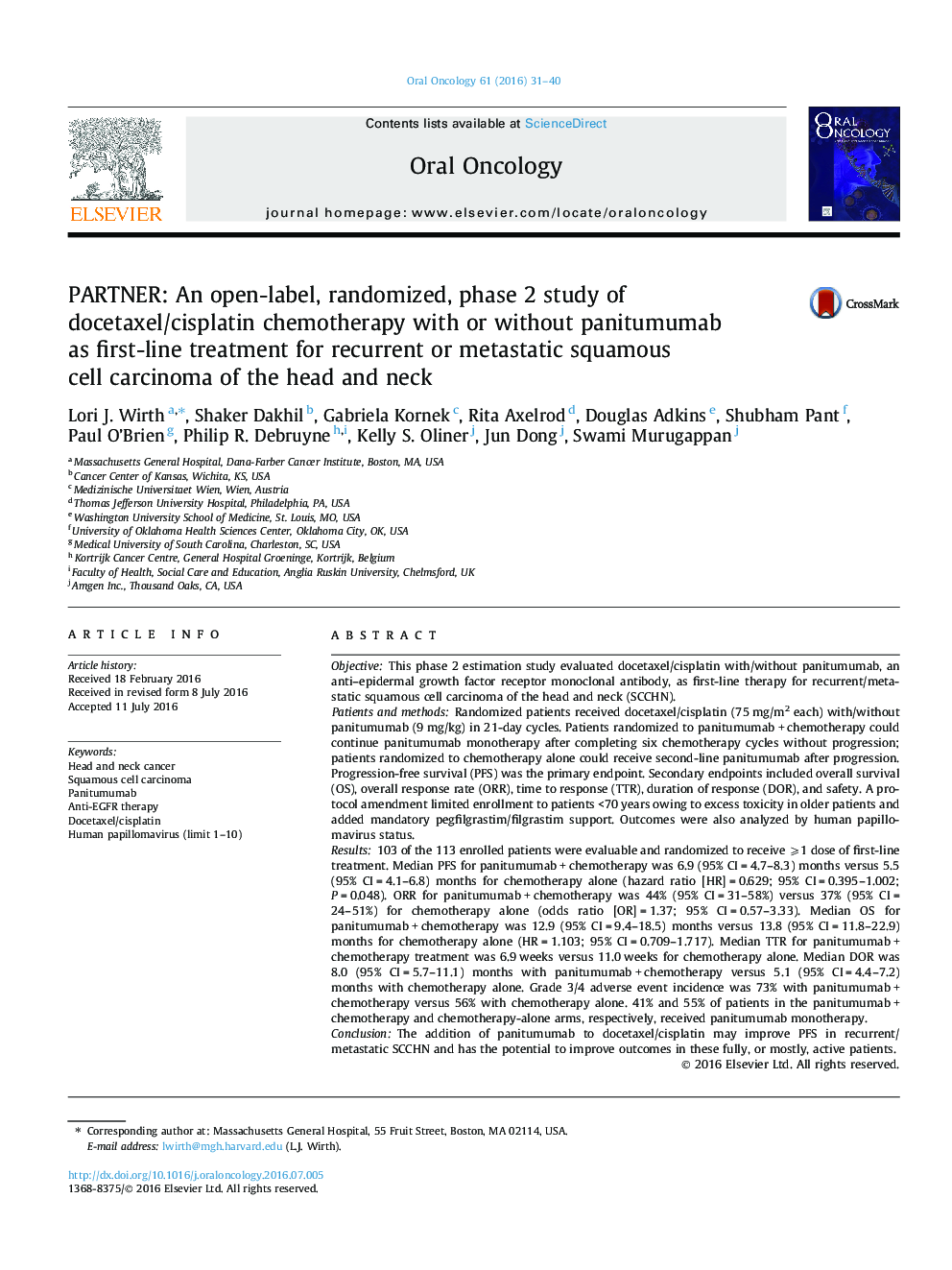| کد مقاله | کد نشریه | سال انتشار | مقاله انگلیسی | نسخه تمام متن |
|---|---|---|---|---|
| 3163720 | 1586249 | 2016 | 10 صفحه PDF | دانلود رایگان |

• Panitumumab activity in patients with SCCHN <70 years was shown through a trend toward improvement in PFS.
• Toxicities observed in patients <70 years were consistent with previous studies.
• Differences between arms in PFS and ORR were greater in the p16-negative group than in the primary analysis set.
• Safety data suggest careful patient selection is needed to limit possible toxicity.
ObjectiveThis phase 2 estimation study evaluated docetaxel/cisplatin with/without panitumumab, an anti–epidermal growth factor receptor monoclonal antibody, as first-line therapy for recurrent/metastatic squamous cell carcinoma of the head and neck (SCCHN).Patients and methodsRandomized patients received docetaxel/cisplatin (75 mg/m2 each) with/without panitumumab (9 mg/kg) in 21-day cycles. Patients randomized to panitumumab + chemotherapy could continue panitumumab monotherapy after completing six chemotherapy cycles without progression; patients randomized to chemotherapy alone could receive second-line panitumumab after progression. Progression-free survival (PFS) was the primary endpoint. Secondary endpoints included overall survival (OS), overall response rate (ORR), time to response (TTR), duration of response (DOR), and safety. A protocol amendment limited enrollment to patients <70 years owing to excess toxicity in older patients and added mandatory pegfilgrastim/filgrastim support. Outcomes were also analyzed by human papillomavirus status.Results103 of the 113 enrolled patients were evaluable and randomized to receive ⩾1 dose of first-line treatment. Median PFS for panitumumab + chemotherapy was 6.9 (95% CI = 4.7–8.3) months versus 5.5 (95% CI = 4.1–6.8) months for chemotherapy alone (hazard ratio [HR] = 0.629; 95% CI = 0.395–1.002; P = 0.048). ORR for panitumumab + chemotherapy was 44% (95% CI = 31–58%) versus 37% (95% CI = 24–51%) for chemotherapy alone (odds ratio [OR] = 1.37; 95% CI = 0.57–3.33). Median OS for panitumumab + chemotherapy was 12.9 (95% CI = 9.4–18.5) months versus 13.8 (95% CI = 11.8–22.9) months for chemotherapy alone (HR = 1.103; 95% CI = 0.709–1.717). Median TTR for panitumumab + chemotherapy treatment was 6.9 weeks versus 11.0 weeks for chemotherapy alone. Median DOR was 8.0 (95% CI = 5.7–11.1) months with panitumumab + chemotherapy versus 5.1 (95% CI = 4.4–7.2) months with chemotherapy alone. Grade 3/4 adverse event incidence was 73% with panitumumab + chemotherapy versus 56% with chemotherapy alone. 41% and 55% of patients in the panitumumab + chemotherapy and chemotherapy-alone arms, respectively, received panitumumab monotherapy.ConclusionThe addition of panitumumab to docetaxel/cisplatin may improve PFS in recurrent/metastatic SCCHN and has the potential to improve outcomes in these fully, or mostly, active patients.
Journal: Oral Oncology - Volume 61, October 2016, Pages 31–40